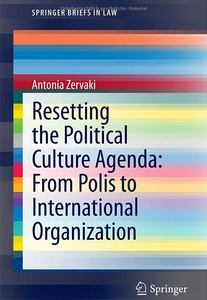Resetting the Political Culture Agenda: from Polis to International Organization
By : Antonia Zervaki
Release date: Jan 2014
Springer
Number of pages: 87
ISBN: 978-3-319-04255-8


The study of international organization has attained significant attention after the end of the Cold War. The aspirations and the evolution of the role of international organizations in the new geopolitical milieu, the emergence of new challenges and the changes global and regional institutions have undergone in order to accom-modate the latter, both in terms of their institutional profile as well as in relation to their normative and operational dimensions, have constituted the stimulus for this renewed interest. The current financial crisis and the involvement of a novel institutional saga in the European continent comprising multilevel sets of obli-gations that bear the normative attributes of different global and regional institu-tions, have also fueled the academic discussion in relation to the role of international organizations and their impact on domestic institutions, policies and politics.
Leaving aside the positivist or functionalist explanations of the role of inter-national organizations in the anagement of world affairs on the one hand, and their impact on the realm of domestic governance of states on the other, there is a growing literature on their contribution to the construction of a world social order, based on shared meanings and normative values. Theories such as sociological institutionalism and constructivism highlight the importance of international organizations in shaping state interests, behavior and identity. Building on these theories, this book aims at relating the ‘‘social ontology and processes’’ of inter-national organizations to their ‘‘social action’’ by introducing political culture, a classic notion used for the analysis of social action at national or sub-national level of analysis, as a conceptual tool for the exploration of international organizations’ identity and their contribution to ‘‘the construction of coherent systems of meanings’’ at international level; to the development of certain ‘‘social skills’’ and ‘‘behavioral patterns’’ by their member states; and the impact of the above on institutional change and policy development.
The methodological path followed departs from the examination of what is considered as the common constituent elements of international organizations’normative environment, that is their ideological, systemic and operational dimensions, and different types of sub-cultures pertaining to each dimension are distinguished. The definition of each set of sub-cultures is achieved through the examination of the interaction among macro (institutional), medium (norms and micro (actors) components of each international organization. The synthesis ofdifferent political sub-cultures traced in the institutional and social context of international organizations will eventually form their dominant political culture.
The theoretical and methodological assumptions are tested on three case studies, the United Nations (UN), the Council of Europe and the European Union (EU), which are perceived as agents of distinct political cultures in the international system. The approach adopted in this research venture, interdisciplinary in character, attempts to provide a conceptual framework and a concrete methodology for the analysis of the social environment and capabilities of international organizations without neglecting their institutional features and their impact on states or other actors.











